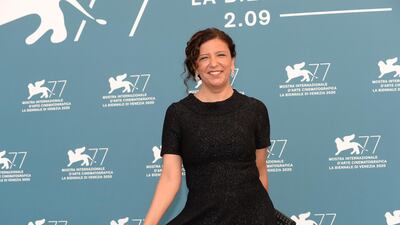A wealthy, celebrated Euro-American artist meets a Syrian refugee and makes an unusual proposal: to use his back as a living, breathing canvas for his latest masterpiece. This conceit is at the heart of Tunisian director Kaouther Ben Hania's second feature film, The Man Who Sold His Skin, which recently had its world premiere at the Venice International Film Festival. "It's shocking," says Ben Hania, of the film's central notion. "And it's intellectually exciting to think about all the repercussions of this."
As far-fetched as it sounds, the inspiration for the film came from real life. In 2006, Belgian artist Wim Delvoye produced the piece Tim, for which he tattooed the back of Tim Steiner, a former tattoo parlour owner from Zurich. He sold the living artwork to a collector, and as part of the slightly macabre contract, Steiner received a third of the sale price and agreed to have his back skinned after his death so the owner could hang this unique piece on their wall.
Ben Hania, 43, who now lives in Paris, saw Delvoye’s human artwork as part of an exhibition in the city’s Louvre museum and the idea for her film began to take shape.
"The original work of art was just a starting point," she tells The National. "Many movies start with an image, then you have to have a story with an emotional journey." The director met Delvoye, who even has a cameo in the film, but went much further than his tattoo – which features a somewhat generic Madonna and a Mexican-style skull – on Steiner's back.
When Sam Ali (Syrian-born newcomer Yahya Mahayni) first appears in the film, the refugee has fled from Syria to neighbouring Lebanon, where he meets, by chance, artist Jeffrey Godefroi (Flemish actor Koen De Bouw). The artist's evocative idea is to tattoo Sam's back with the image of a Schengen visa, the much-desired legal requirement to enter Europe. Visas were on Ben Hania's mind even before she saw Delvoye's exhibition. "I'm Tunisian, and I went through this process to come to Europe," she says. "You have to get the Schengen visa, so I went through this crazy process for my residency permit in France."
She specifically remembers frustrations about being unable to travel to England when her first feature, 2017's Beauty and the Dogs was selected for the BFI London Film Festival. "I was angry because I'm not born in the right place … I was asking myself: 'What's the difference? Why?'"
The same questions, you imagine, run through Sam's mind in the film.
Making its premiere last week in Venice's Horizons section, which is meant for more daring movies, and winning the Best Actor award for Mahayni, The Man Who Sold His Skin certainly lives up to this billing. Flush with challenging ideas – about art, commerce and exploitation – it also deals with freedom. "What does it mean to be free?" Ben Hania asks. "You don't have a choice when you are a refugee. When you don't have much of a choice, what does it mean to be free or to seek freedom?"

The Man Who Sold His Skin is also a film that re-examines the portrait of the artist – here envisioned as Mephistopheles-like character. "I was at some point fed up with classic profiles of artists in cinema," Ben Hania says. "They are marginalised, tormented, sometimes alcoholic, sometimes misunderstood. They are struggling with their demons; but we are in an era where artists are becoming entrepreneurs. I wanted to create a more modern profile of an artist."
Ben Hania draws comparisons between art and religion. "People go to museums searching for meaning, trying to understand things. They think that artists can give them meaning. There is this kind of relationship ... People are thirsty for meaning. This is their relationship with art in general."
Having studied in Tunisia and France, where she attended the Sorbonne University, Ben Hania's refined tastes shine through in The Man Who Sold His Skin. It's a visually rich work, thanks in part to cinematographer Christopher Aoun, who shot Lebanese director Nadine Labaki's Oscar-nominated Capernaum. It even stars Italian screen siren Monica Bellucci, who plays Godefroi's scheming assistant, yet for all this, it was "very difficult" to get financed, the director says.
“The first reason was because of my profile. Since I’m used to doing movies only in Tunisia, my country and about women … it defines you.”
Her earlier film, Beauty and the Dogs, which opened in Cannes, was a powerful story of a woman raped by several policemen who must report the crime to the authorities. But when she began to pitch The Man Who Sold His Skin, the feedback was ignorant. "[People would say] 'We don't expect a director from Tunisia to talk about contemporary art … it's too international for you.'"
Ben Hania refused to be deterred until she found financing. Whether she will continue to make international films, however, remains to be seen, but she does not think in those terms. “I don’t take the decision to make a movie that way. It’s about my desire to tell a story,” she says.
For the moment, she is returning to the documentary format where she began her career with films such as 2010's Les imams vont a l'ecole, which dealt with apprentice imams at the Great Mosque of Paris.
Her latest non-fiction tale is still a work in progress, she says. It concerns a woman with four daughters – two of whom were in ISIS. "Sometimes, I think I am doing this job to learn stuff, to research," Ben Hania says.
“I love it when I start a new project in a completely different zone, where I am an outsider and I become very familiar with things. That is why with my films – there is no one film like the other.”
You might say her work is as unique as that tattoo on her actor’s back.


